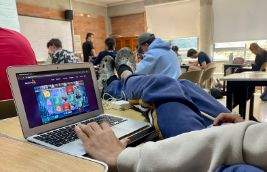
In the dynamic landscape of high school life, extracurricular activities often play a significant role in shaping students’ experiences. However, a less-discussed aspect is the presence of gambling activities during and after school hours. This feature
aims to shed light on the positive and negative impacts of students engaging in gambling, exploring its effects on the community and the lives of teenagers. Gambling can offer positive experiences, such as fostering social bonds and interaction, honing strategic thinking and decision-making abilities, and providing entertainment and stress relief. Conversely, when teenagers engage in gambling, it may lead to negative consequences like developing addictive behaviors, experiencing academic distractions and performance decline, and straining social relationships while facing isolation. As a senior from TCS, I have seen students’ addiction to gambling during and after school hours, and while I’ve noted some positive aspects worth considering, my overall perspective on gambling leans towards the negative, based on what I’ve observed and contemplated.
Positive Effects
Gambling, when approached responsibly, can foster social interaction and bonding among students. Friendly poker games or other low-stakes activities can serve as a platform for students to connect and build friendships. “I’ve come close to my friends ever since we started playing poker, it’s like we could find something in common and now it makes it easier for me to talk to other people around me that I never knew before,” Senior, Pedro Gonzalez said. According to the CCE news team in an article they wrote, even though gambling has been a very controversial matter for many years there are many positive effects that many people don’t see. Some of these effects are providing opportunities for social interactions and building relationships.
Certain gambling activities require strategic thinking and decision-making skills. Engaging in these activities, in moderation, can help students hone their cognitive abilities and develop a sense of calculated risk-taking. Not only does it increase their skills in risk management and strategy but it also improves their skills in mathematics as it provides real-world examples of probabilities, statistics, and again risk management.
“I know many might say that gambling is probably more stressful than entertaining and relaxing but in my personal experience it has brought me a lot of stress relief and it is something I have been able to enjoy with my friends,” Grade 10 student, Cristobal Villegas said.
For some students, engaging in low-stakes gambling can serve as a form of entertainment and stress relief. In moderation, it may provide an avenue for relaxation and diversion from the pressures of academic life. While some students might think gambling is going to be a stress relief for their whole life, we still need to take into consideration that for individuals struggling with anxiety, depression, or other mental health issues, gambling can provide a temporary escape from their problems.
Negative Impacts
Excessive involvement in gambling activities can lead to distraction from academic responsibilities. Students may find it challenging to maintain focus on their studies, impacting their overall academic performance. “Gambling affects students because they use time off studying or doing homework to gamble with friends. This affects their brain because the dopamine reward in short terms will make them choose the task that is more entertaining for which in this case it’s gambling,” Psychologist, Antonio Herran said. Gambling during school hours affects their academic performance and if it becomes a regular occurrence the only thing they will be thinking about is gambling and going to the casino, so they lose interest in things that might seem less amusing but are going to be more helpful in the long term.
For some students, what starts as a casual activity can escalate into a full-blown addiction. The development of addictive behaviors can have long-term consequences on mental health, well-being, and prospects. “Students get an addiction because they get carried for the pleasure of betting which is the dopamine in their brains. They will search for things like gambling that will get their emotions up instead of finding something that gives them peace and tranquility,” Herran said.
Teenagers that do these activities in small amounts will not have a negative impact, but if this becomes regular then they will be taking risks and they will start making bad decisions. This will also make students more prone to becoming addicted to any type of gambling.
Students, especially those with limited financial resources, may face significant financial challenges as a result of gambling. Losses incurred during gambling can lead to financial strain and negatively impact a student’s ability to meet their needs. Casinos are not a bad thing if you know the reason why you are doing it and that you are conscious of what you may be losing. “Every brain is different so there are people more susceptible to becoming addicted making it like Russian roulette. If people go once a year and have a little fun there are no negative consequences. Casinos are like any other thing in life, in excess, it might bring a lot of problems, but if it’s done with consciousness the consequences will be less dangerous,” Herran said. Many times the financial consequences won’t be as bad since at this point in their lives they don’t have a lot of income. But in the long term starting gambling at such a young age the day their incomes increase they will be more susceptible to risk all their money.
As the high school community navigates the complex terrain of student activities, it is essential to acknowledge both the positive and negative impacts of gambling during and after school hours. Open discussions, informed decisions, and responsible guidance can contribute to a healthier and more supportive environment for students, ensuring that extracurricular activities enrich their lives without compromising their well-being. While gambling is a very risky activity, anyone who does it consciously and at reasonable times won’t have as many negative consequences as other people who do it because they are addicted to it and aren’t thinking of the dangers they are crossing.
“I’ve been gambling with my friends for a while now, and I am aware that sometimes I risk many things, but most of the time I do it because it is a distraction from problems or things I do not want to think about,” Grade 10, student Miguel Gonzalez said.



